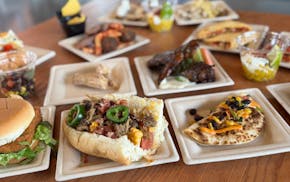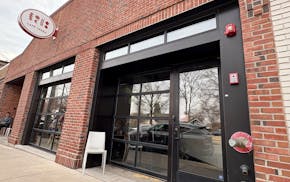With the rushing waters of the Mississippi River in the background, famed author, restaurateur and television host Lidia Bastianich bent her head toward a patch of green stalks bobbing in the light breeze.
She listened intently as Linda Black Elk identified plants, citing their names, uses and history as they strolled the grounds near Owamni in Minneapolis. Bastianich broke into a wide smile — the one instantly familiar to generations of television viewers and food fans. She had just learned something new, and soon she'd invite all of us to the table to share in the revelation.
Black Elk is an ethnobotanist and food sovereignty activist with NATIFS (North American Traditional Indigenous Food Systems), the nonprofit that operates Owamni. Chef Sean Sherman's group is at the forefront of a conversational shift in food activism in America that is centered on decolonizing the plate, and is one of the reasons Bastianich was in the Twin Cities.
Her PBS television special "Lidia Celebrates America: Changemakers" premieres Nov. 26, and Sherman's James Beard Award-winning restaurant Owamni is a focal point.
Black Elk, Sherman and the beloved celebrity chef would eventually move inside to feast with other food activists and farmers from across the country who are leading new conversations about food through their work.
We sat down with the trio before filming the dinner scene to talk about the beauty of rural America, forging strong roots and the importance of relentless curiosity. The conversation has been edited for length and clarity.
You've been to this part of the Midwest before. What keeps you coming back?
Bastianich: Sometimes I think America is not appreciated enough. America is beautiful and wonderful. What is this big country that gave so many people — certainly me — so much?
Food opens the door. You can sit with somebody at the table, eat their food and understand something about them. I use food to tell the American stories that I appreciate, that I love.
This whole episode is about how in these difficult times, we waste maybe 40 percent of the food we grow. And yet, people are hungry. There needs to be awareness of the people in the industry of food and farmers. What really intrigued me was Sean's return to the Native culture's cooking.
In this country, with all the different topography and climate, the Native people of the areas know how to cook with the things that are available to them. A lot of that knowledge was taken away from them. And what Sean is trying to do is revert that.
Sherman: Our work was just realizing the absence of Native American cuisine out there. There were no Native restaurants, no cookbooks, nothing to represent where we are. In every city we can have food from all over the world, but nothing that's from the land that we're standing on.
Black Elk: Because our food access was taken from us, our education was taken from us. We were able to hold onto some pieces. We still have stories about plants and medicine. It's really important to us to highlight the amazing food cultures that are around the Indigenous lands. We're talking about the foods that have been here long before Europeans stepped foot on these continents. Thinking about the food systems, there's immense diversity. No matter if you're at the bottom of Mexico or the top of Alaska, there's so much to talk about. We're using food as a language to get people curious.
Some of these methods, like eating within the seasons and using ingredients that grow nearby, sound familiar to what I've learned from Lidia's show and cookbooks.
Lidia: I come from a simple farm background where foraging was very much a part of the seasonal rituals. A lot of the herbs you have here, we have in Italy. Maybe collected for different uses, but there are a lot of discoveries, too. Like medicinal uses, whether you make it into an infusion, rubbing it on. I find this all very interesting.
And you know, people are reverting more and more to those natural methods. I think that industry, especially around food, has taken charge of us. What we're eating is big industry. We are kind of revolting.
Black Elk: They've taken the medicine out of the food, right? And replaced it with a lot of sugar and fat. As you always say, Sean, we're not trying to go back in time and re-create things, but to get back to a place where food is medicine again.
Like what do people think when they think of Native American food? Fry bread? That was what the people made when there wasn't access to traditional foods. It's like when people say Italian food and think of heavy, cheesy sauces over pasta and not bright tomatoes or medicinal herbs. I think the mission is really the same: talking about the medicine and abundance.
That makes me think of Lidia's recipe for dandelion greens. It's a scarcity mindset of only being able to work with what's given to you, when in reality you can just walk outside and find these ingredients that can become delicacies.
Sherman: For free! Which is a big deal right now.
What's interesting is how all three of you are raising this awareness through storytelling.
Bastianich: In this whole special, what I found throughout America is that there are conscious people that are really connected to the Earth, to the nourishment and to the ways of the environment. Each one has their own story. And these are stories that have lived through centuries and, all of a sudden, modernization changed that.
It's not about going back in time, but it's about remembering the time when people and the land would coexist.
You know, with the dandelions. We would go out with a little knife to pick them, but my grandmother would always say, "Leave the root for next year." Mushrooms, we would only cut off some and leave the rest for next year.
Sherman: I think it's wild how they vilified dandelions when they are so delicious and good for you.
Bastianich: When it's young you can just eat it, but even when you boil the older, tough leaves to make them tender, you can save the water as a diuretic. We would save that water all year.
Black Elk: That's so funny. Native people do that exact same thing.
It's remarkable how similar we are when we get down to the places that formed us.
Sherman: Food is something we all have in common as humans. So, it's a language we all speak. That's why people like to watch food shows. And that's why people like to come to restaurants. They like to learn. And I think that we're at a point now where there's a lot of food coming from other cultures instead of cultures trying to showcase someone else's food.
About the episode
What: "Lidia Celebrates America: Changemakers," a special by Lidia Bastianich.
When: 9 p.m. Nov. 26 on TPT.
What it's about: The first 20-plus minutes of the hourlong episode are centered around Bastianich's visit to Minnesota. The common thread throughout her stops across the nation: sustainability. Each "Changemakers" episode culminates with a dinner, filmed months later, with all the makers coming together at one table. In this episode, the dinner was at Owamni in Minneapolis.
Fun fact: In previous episodes, each guest brings a dish to the gathering that represents their work. But because Owamni's kitchen doesn't use colonized food, the entire dinner was prepared by Owamni chefs.
Her stops: Bastianich had lunch at the Indigenous Food Lab in Midtown Global Market; learned about chef Sean Sherman's groundbreaking efforts around Native cuisine at Owamni; prepared (and ate) pesto and pasta made from crickets with Claire and Chad Simons of 3 Cricketeers in St. Louis Park; and had dinner with Kate and Gustavo Romero and the Simonses at Oro by Nixta, with dishes made from crickets and other proteins.
Lidia loves Minnesota
We also talked to Lidia Bastianich about all things Minnesota, including her previous visits.
On ice fishing: She kissed an eelpout while ice fishing in Walker, Minn. "Seeing that whole lake lit up with houses on the water — and there were fires in the houses! I said, 'This is going to melt down!'" It didn't and she took part in the tradition of catching and kissing the prehistoric fish.
On championing local talent: Bastianich produced Minnesota cookbook author Amy Thielen's Food Network show "Heartland Table." "She reminded me of me, the way she cooks from her garden and how she lived in the nature that surrounds her."
Her favorite role: Chef, restaurateur, cookbook author, television host — of the many roles she has, which is her favorite? "Grandma."
Why she'll be back again: "The Midwest offers a unique window into America. There is such generosity and because of the immigrants that settled in these places, so many stories. I'm deeply curious and the more I see, the more I want to learn."
![Basketball courts at the new Lifetime Fitness at Southdale Center in Edina, Minn., on Monday, December 2, 2019. ] RENEE JONES SCHNEIDER ¥ renee.j](https://arc.stimg.co/startribunemedia/6RAMR36J56VI6UXLMJJHL4FJIU.jpg?h=91&w=145&fit=crop&bg=999&crop=faces)
Medcalf: Life Time's plans to close Minneapolis, Edina courts deserve pushback

It's the worst roadway in Twin Cities. And it's at MSP Airport.

3 new foods to eat at CHS Field when at a Saints game this season

Midcentury Edina rambler transformed to optimize 'every inch' of space

